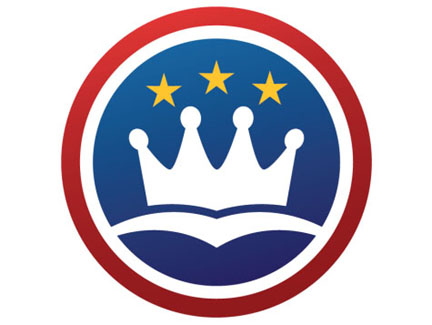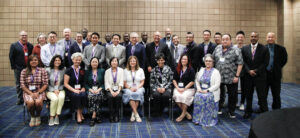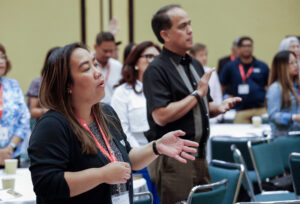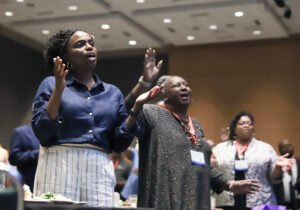
 No one knows how the legend came to Yang Jauh village.*
No one knows how the legend came to Yang Jauh village.*
Hidden away on a remote South Pacific island, the village is home to an ancient people known as the Sayang.* For centuries they have survived in isolation, bound by the promise of an ancient legend that foretells the arrival of a white-skinned foreigner bearing a "precious" gift.
That promise was fulfilled the day Southern Baptist missionary Michael Martin* came to Yang Jauh and began sharing the Gospel. It was the first time anyone in the village of more than ten thousand people had ever heard the name of Jesus Christ.
What about the millions of other people across the earth waiting, like the Sayang, to hear the Good News for the first time? Who will tell them? What will it take to ensure that every tribe, tongue, and nation hears the story of Jesus?
This is the question that drives Martin and more than 5,500 other Southern Baptist missionaries as they serve God on the frontlines of lostness through the International Mission Board. Supported by a Richmond, Virginia, based staff of more than 450, these missionaries are the hands and feet of thousands of Southern Baptist churches that have chosen to answer God's Great Commission calling.
On May 10, 1845, the newly founded Southern Baptist Convention established the International Mission Board (then the Foreign Mission Board) for this singular purpose — to serve churches as they began the task of taking the Gospel to the ends of the earth.
Over the next 160 years, thousands of missionaries were sent from Southern Baptist churches  across the United States to Gospel-deprived places and peoples around the globe — missionaries such as Samuel Clopton, the first Southern Baptist missionary, or the now legendary Lottie Moon, who spent nearly forty years helping the Chinese and challenging Southern Baptists to send more help, to contemporary missionaries like Michael Martin. Though methods and strategies have changed, the urgency of the task remains constant.
across the United States to Gospel-deprived places and peoples around the globe — missionaries such as Samuel Clopton, the first Southern Baptist missionary, or the now legendary Lottie Moon, who spent nearly forty years helping the Chinese and challenging Southern Baptists to send more help, to contemporary missionaries like Michael Martin. Though methods and strategies have changed, the urgency of the task remains constant.
"There's a common misperception that the International Mission Board exists to do missions on behalf of Southern Baptist churches," says Jerry Rankin, IMB president. But Christ didn't give the Great Commission to the IMB — He gave it to the church.
"We are all, every believer, commanded to take part in sharing Christ's message of salvation with all peoples. It's not a question of calling but of obedience. The IMB's role is to empower churches to find their place in the Great Commission and encourage them to ever greater levels of missions involvement."
More important is how God has blessed churches' obedience to the Great Commission, using the witness of their missionaries to bring untold numbers to saving faith in Christ.
Gospel Advance
Today IMB missionaries and their national partners work around the world, engaging more than 1,190 people groups with the Gospel (a people group is the largest group through which the Gospel can flow without encountering significant barriers of understanding or acceptance, such as language and ethnic identity).
Approximately 100 of these 1,190 people groups were engaged for the first time in 2007, meaning no one was previously working to start new churches among them. These newly engaged groups have a combined population of more than 188 million, and nearly all of them are considered to be unreached (less than 2 percent evangelical Christian).
In 2007 Southern Baptist missionaries and their partners also saw numbers of overseas churches climb to the highest level in history — almost 182,000, surpassing the ten million-member mark for the first time. Nearly 27,000 of these churches were newly planted.
What's more, baptisms topped 565,900, representing an average of about one baptism per minute. Missionaries and partners also saw some 1.97 million new believers and church members involved in discipleship and nearly 228,600 in leadership training programs.
But despite these dramatic advances, Southern Baptists' Great Commission task isn't yet complete. Overwhelming lostness remains.
The earth is home to 6.8 billion people, divided among some 11,550 people groups. Of those people groups, more than 6,400 — 3.9 billion people — are considered unreached. Many of these groups live and die in almost complete spiritual darkness with few, if any, evangelical Christians among them and no one working to start new churches. With little to no access to the Gospel, these people have limited opportunity to know the saving grace of Jesus Christ.
"Paul writes in Romans 10 that everyone who calls on the name of the Lord will be saved," Rankin says. "But how can they call on Him in whom they have not heard? How can they hear without a preacher? And how can they preach unless someone sends them?
"There's no doubt about Southern Baptists' passion for missions. Their heart for the lost is evident every time they pray for a missionary or give to missions through the Cooperative Program and Lottie Moon Christmas Offering.
"But the only way we are going to complete the task God's given us is for churches to take even greater ownership of the Great Commission. That means adopting unreached people groups, challenging their membership to form strategic partnerships, and sacrificial giving to provide the means to send increasing numbers of new missionaries."
Rankin says Southern Baptist churches and missionaries must also continue to expand their efforts to work in tandem with national Baptist partners, tentmakers, and other Great Commission Christian organizations.
Fulfilling the Great Commission also means some dramatic changes for the IMB.
The Task Ahead
In September, trustees of the International Mission Board began to lay the foundation for a major reorganization that may reshape the way Southern Baptists see the mission field.
While affirming the basic task for which the IMB was created — engaging all peoples with the Gospel through evangelism, discipleship, and church planting — Rankin says the changes are designed to further accelerate God's global harvest, maximize the effectiveness of frontline missionaries, and create a more efficient, cost-effective structure of administration and support.
These changes include revisions to the IMB's vision and mission statements and core values. They also represent an identity shift, expanding the singular role of a "missionary-sending agency" to include serving and encouraging churches while looking for God-provided opportunities for influence through relationships with other missions entities.
Many of the changes focus on the IMB's internal organization and structure and will be most visible to missionaries and staff. The goal is to minimize administrative responsibilities and infrastructure while maximizing the effectiveness of witnessing, discipling, church planting, training, and engaging unreached people groups.
"Past performance doesn't guarantee future results," Rankin says. "In 1997 we made some radical changes in our organization and strategy to align the IMB with what God was doing in the world, and He's blessed those efforts with unprecedented advance of the Gospel.
"But this is not the same world it was ten years ago. It would be foolish to presume that the methods and strategies we've used in the past will continue to be relevant and effective in the future. The world is changing and we must change with it."
Rankin pointed out that in today's world, lostness is no longer limited by borders or geography. Modern technology, economic factors, communication, and travel have scattered many people groups across the earth. To reach them, missionaries need the freedom to pursue the lost regardless of their location.
This is why the IMB is abandoning its eleven geographically based regions and reorganizing to more closely align missionaries' efforts with specific people groups.
Instead of regions, missionary teams will be divided among more than eighty "clusters," which are groupings of multiple missionary teams focused on reaching similar peoples. Clusters will be affiliated with one of eight global "affinity groups."
Affinity groups are large groupings of related peoples that share similar origins, languages, and cultures. They're also a lens through which missionaries can focus and coordinate strategy to share the Gospel.
This decentralized arrangement is designed to empower missionary teams and clusters to engage unreached people groups with greater freedom, all within the context of the IMB's global missions strategy.
New measures also will be taken to streamline IMB field administration by consolidating support services into four administrative hubs around the world. Linked with the IMB's home office in Richmond, Virginia, this centralized support system will provide uniform accountability, stewardship of resources, and quality of services in meeting the needs of field personnel.
"The courage to change reflects the urgency of reaching a lost world and the IMB's commitment to relevance in the global missions task," Rankin says. "We are reorganizing — not for change's sake — but to empower a passionate generation of new missionaries driven to take the Gospel to the nations and to see every people come to know Jesus Christ.
"Without qualification Jesus sent us to the whole world to make disciples of all nations. We must do whatever is necessary to ensure the IMB is best positioned to continue serving Southern Baptist churches as they seek to fulfill the Great Commission."
*Names changed.
IMB At a Glance
Mission
• Our mission is to make disciples of all peoples in fulfillment of the Great Commission.
Core Values
• We commit to obedience to the Lordship of Jesus Christ and to God's inerrant Word.
• We believe Jesus Christ is God's only provision for salvation and all people without personal faith in Him are lost and will spend eternity in hell.
• We seek to provide all people an opportunity to hear, understand, and respond to the Gospel in their own cultural context.
• We evangelize through proclamation, discipling, equipping, and ministry that results in indigenous reproducing Baptist churches.
• We serve churches to facilitate their involvement in the Great Commission and the sending of missionaries to bring all peoples to faith in Jesus Christ.
• We partner with Baptists and other Christians around the world in accordance with IMB guidelines.
• We understand and fulfill God's mission through God's Word, prayer, and the leadership of the Holy Spirit.

















